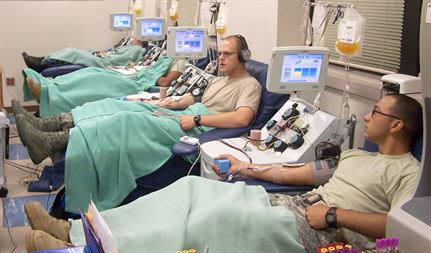Every year, millions of people across the globe need blood. Whether to cure disease or escape death, blood is donated to ensure the health of others worldwide. Blood centers around the globe receive blood donations from willing patients. The blood is then processed and packaged to be donated to hospitals and health centers for medical use. To become a blood donor, one must meet the requirements of being at least 16 years of age, weigh 110 pounds, and be in general health. Certain blood donation centers require parental consent if age 16, and often state more specific requirement questions to the patients. Overall, donating blood creates a positive impact for the community and worldwide.
Angela Scioli, a Leesville Road social studies teacher, is a fifteen year blood donor who gives blood to medical centers across Raleigh. Scioli says she tries to donate often, but usually is inconsistent due to health issues and location difficulties. “I do not donate often, mainly because women have a problem with their low in iron,” Scioli said. Despite the difficulties, Scioli believes giving blood is the most efficient way to contribute to a positive cause.
“[Donating blood] is the most important, and simplest way to do good in the world. If you have ever had a family member or loved one in the hospital, and they’ve ever needed blood, you realize that their life is literally in the hands of the public having undergone the donation process,” said Scioli.
Scioli feels frustrated when there is a shortage of blood donations, for how simple and quick the process takes. “You walk in, it doesn’t even hurt, you get to relax, you are donating to a good cause, and most importantly there are free snacks afterward,” said Scioli.
Throughout history, modern technology and increasing medical knowledge has influenced medical treatments and techniques globally. Now with enhanced detail of the human body and its functions, doctors have a better understanding of blood types and their unique differences.
The four different blood types are A, B, AB, and type O blood. Each blood type, except for type O, contains antigens. Antigens are what allow blood to be donated. Type O blood is considered the “universal donor” due to its lack of antigens, which allows for blood compatibility. Blood compatibility depends on one’s blood type, which is very important to blood donation centers for matching the blood types with one another, for problems could occur if the incorrect blood type is given to a patient.
Medical centers and hospitals across the globe use the donated blood to provide aid to the patients. Donated blood is mainly used for the severely ill or dying patients. Although donated blood can be used for other various medical treatment methods.
Donating blood can be beneficial to both the patient(s) receiving blood, and the blood donor. The patient(s) receiving blood are usually ill or in need of medical support, the donated blood can restore one’s health and help regain strength. The blood donors also benefit through the possibility of receiving a blood donation bonus. Donors can be paid from a range of twenty to fifty dollars depending on how much blood/ plasma a donor gives. The Food and Drug Administration (FDA) set boundaries for blood donor bonuses based on weight. A person’s weight can affect the amount of blood one can donate, which can affect the total amount of the bonus. After the donation procedure, free snacks are provided to the blood donors to regain blood sugar strength. Blood donors benefit themselves, just as patients benefit from the donated blood.
Throughout history, multiple blood donation organizations have gained recognition and expanded across the nation. The American Red Cross Association and The Blood Connection are examples of blood donation organizations that hold donation processes across the United States. The blood organizations provide simpler access to the public, as well as creating a more centralized, efficient, and professional blood donation process.
Becoming a blood donor can impact the lives of others around the world. Through blood drives and donation centers, the accessibility to donating blood has never been easier and accessible to the public. Donating blood is an easy way to contribute to a community in need. Due to natural disasters, illness, and international quarrell, giving blood can possibly save the lives of others around the globe.

Hi! My name is Chase and I am a staff writer for The Mycenaean. Two fun facts about me are that I enjoy playing guitar with my dad and friends, and I also am a two-time spikeball tournament champion.

Leave a Reply